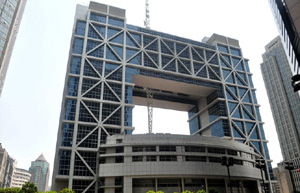'Through train' will unleash the potential of puts and synthetic equities, reports Emma Dai in Hong Kong.
The Shanghai-Hong Kong Stock Connect is creating a market for new derivatives that will allow investors to hedge against underlying exposure or simply speculate, according to stock brokers and investment analysts.
"The Stock Connect arrangement looks set to create favorable conditions for derivative products with underlying A-share assets," said Thomas Fang, managing director of equity derivatives sales at UBS AG. "Under the legal framework of the arrangement, we were advised that there is no restriction on the issuance of (over the counter) derivative products," he said. "We are already working on those."
At present, foreign investors can only participate in Shanghai's A-share market through the Qualified Foreign Institutional Investor and Renminbi Qualified Foreign Institutional Investor programs, which have a combined quota limit of $108.39 billion.
But with Stock Connect on the horizon, the investment landscape is about to change.
The new cross-border program, widely expected to start later this month or in early November, will allow overseas investors to trade in selected A shares and mainland investors to trade in a group of Hong Kong-listed H shares.
The link provides a daily quota of 13 billion yuan ($2.12 billion) to northbound buyers and an aggregate "net buy" quota of 300 billion yuan.
"Once a market is opened for both institutional and individual investors, one can expect an increase in demand to hedge, to preserve capital, to lift leverage and to enhance yield," Fang said.
"In developed markets, the sizes of the spot and derivatives markets are usually comparable. We estimate that QFII and RQFII investors generate an average of about $1 billion turnover a day in the A-share market and that demand for derivatives based on A shares will be roughly the same among overseas investors," he said.
"We also forecast that, around three to six months after the 'through train' kicks off, the offshore A-share derivative market will burgeon and, within a year, should reach about $100 billion," Fang said.
He added that most of the demand will come from private banks, which seek opportunities to maximize their clients' asset holdings. Many private banks, Fang said, are already trading actively in the OTC market of structural products based on Hong Kong-listed mainland companies such as Tencent Holdings Ltd and China Mobile Ltd.
"Overseas investors are seeking allocations and exposure to the A-share market and other yuan-denominated assets. Increased demand for A-share derivatives is a given; the question is: how can we cater to it?" Fang noted.
The strategy, he and others said, is to just add A shares as underlying assets for popular derivative products.
"One of the most popular structured products is equity-linked notes, which are put options that enable investors to choose either to maximize capital gains on secure, higher investment yields or to acquire particular shareholdings at a desirable price.
"Other yield-enhancement products such as fixed-coupon notes, auto-callable notes and accumulators are also in demand," Fang said.
"We are also thinking about dollar-denominated products," he said. "The availability of yuan is still a concern for many individual investors, given that the 20,000 yuan daily transaction cap is still there."
|
 |
 |
| Stock Connect delay worries investors | Hedge funds wait for green signal to ride 'through train' |
